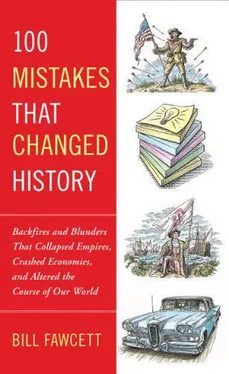Julius Caesar did arrive at Alesia and found more than 100,000 Gauls entrenched in the city and ready to resist any attack by his 60,000 Romans, auxiliary, and German cavalry. He could not leave that large an army in his rear. Vercingetorix was right; Caesar could not continue to Provence. It was also obvious that attacking the high walls of Alesia with almost double their number in defenders behind them would have been suicidal for the Romans.
So Caesar did not attack.
Instead he ordered his army to begin building a wall around the entire city. Crossing two rivers and fronted by a twenty-foot-deep trench, Caesar’s inner wall ran for ten miles and completely cut off Alesia. There was a tower every 120 feet and all sorts of traps and sharp objects scattered in front of the wall that served to break up any Gallic attack. And the Roman legionnaires could dig. Every night they fortified their camps within walls made from stakes they carried on the march. The walls around Alesia soon proved as immune to attack as the walls of that city itself.
So the Gauls waited vainly for a Roman attack that never came. By locking himself up in a city, Vercingetorix had managed to take a great field army and trap it inside Roman walls. He had turned it from a battle of swords and spears to one of shovels and picks. He had managed to put his larger army in a position in which they had to fight on Roman terms, and no one could dig, build, or defend any wall better than the Roman legionnaires.
When it became obvious he was under siege and unable to break out, the Gallic leader sent out riders to summon all the warriors not trapped in Alesia to come to his relief. They got out just before the first wall was completed, but not without the Romans learning of their mission. Knowing that someday another army would most likely appear to relieve the siege of Alesia, Caesar ordered yet another wall built. This wall faced outward and ran for fourteen miles. By the time the relief army arrived, the second wall was finished. It all came down to a climactic battle fought among the Roman walls.
Vercingetorix also now had a serious problem: Inside Alesia they had run out of food. He had already driven out the women and children, whom Caesar refused to let pass out through his walls. So they starved, exposed just below the city’s walls and in sight of their husbands and fathers. The Gauls had to break through both walls and free Vercingetorix’s army or starvation alone would force it to surrender.
Over 200,000 more Gauls, less well organized but ready to fight, appeared outside one section of the walls. The Romans were facing perhaps nearly 300,000 Gallic warriors inside and out with 40,000 legionnaires and 15,000 other auxiliaries, including 5,000 Germanic horsemen. They were outnumbered six to one, but they were fighting their kind of battle. The battle was fought on Roman terms and amid the Roman fortifications. Even so, the final confrontation at Alesia was a close thing and only a last-minute charge by the Germanic cavalry saved the day.
The relief army was stopped, broken, and scattered. The men in Alesia remained trapped and starving. A few days later, Vercingetorix personally rode into the Roman camp and surrendered his army. His 90,000 warriors became slaves and never again did the Celts of Gaul resist rule by Rome.
Vercingetorix made one mistake in an otherwise brilliant revolt. He voluntarily trapped his army inside Alesia in a position that played to the Romans’ strengths and nullified his own. Had Caesar attacked, the Romans would have suffered terrible casualties, but in war you should never assume the enemy will do what you want. Had the Gallic army of 300,000 warriors met Caesar in an open field, they might well have triumphed. If Vercingetorix had not made the mistake of locking his army inside Alesia, France, then the world today would have a lot more Gaul and a lot less Roman in it.
Most Useless Cut of All
44 BCE
In 458 BCE, when the consular army of Rome was besieged by the Aequins, the Senate declared a state of emergency so they might elect a dictator to save them from their peril. They chose Lucius Quinctius Cincinnatus to take up this noble cause. He defeated the Aequins in one day, led a triumph through Rome, and shortly thereafter returned to his quiet, peaceful life as a farmer. Though most people today have not heard of Cincinnatus (aside from the city bearing his name), he had quite an important role to play in history. In the eyes of the Roman republic, he was the ideal citizen. He took command when the country needed him most, and he gave it up just as easily when the danger had passed.
In the glorious days of the republic, citizens recited the accounts of Cincinnatus as a reminder to those seeking absolute authority. Not all who listened heeded the warnings. Gaius Julius Caesar, for example, took far more interest in stories about fighting men like Achilles and Alexander the Great than he did in those about part-time warriors like Cincinnatus. He believed leadership must be determined by might, and in 49 BCE he exercised that might when he crossed the Rubicon with his army and marched on Rome. His army then controlled the city, and the mob adored him. After Caesar’s exploits in Egypt, his influence increased again, and he became even more powerful. Certain members of the Senate thought that he meant to take total control, and they came to the conclusion that he had to be stopped at all costs. So, on the Ides of March 44 BCE, these members stabbed Caesar to death on the Senate floor, thus ending the reign of the would-be dictator and stamping out any possibility of empiric rule. With Caesar’s threat gone once more, the Senate would rule the empire. Well… not exactly. In fact, the death of Julius Caesar had the opposite effect and forever put an end to the great age of the Roman republic.
Rome became a republic in 509 BCE when the people rose up against the last of the Etruscan kings, Tarquin the Proud, and deposed him. Although they rebelled against their king, the people still saw the need for supreme authority. So, they gave this power to two consuls who served one-year terms of office. Each had the power to veto the other, and neither could change the laws without the other’s permission. The government also included a Senate made up of the fathers of the community, or patricians . In the fifth century BCE, the government created the Tribunate of the Plebes in response to outcries by the plebeian class. Similar to the House of Commons, this branch consisted of a plebeian assembly and a tribune . The plebeian assembly included all the plebes of Rome, and they elected the tribune, who served one-year terms and had the power of veto, which by the way means, “I forbid.” The system seemed flawless, but it did not take into account humankind’s hunger for power.
Rivalries grew rampant in the government with each man vying for his own political gain. These rivalries came to a head in 91 BCE after the assassination of the newly elected tribune, Marcus Livius Drusus, who had some radical ideas like extending citizenship to all cities on the Italian peninsula. Needless to say, “Power to the people” was not in vogue at that time. Ten years later, antagonisms flared up again because of contention between two men, Lucius Cornelius Sulla and Gaius Marius. Sulla wanted to strengthen the power of the Senate, but Marius resisted him. Upon being elected consul in 88 BCE, Sulla had his authority undermined when Marius tried to take command of the army from him. Although Sulla was in Naples preparing to go to war against the king of Pontus, whose forces were encroaching on Rome, he elected instead to turn back to Rome and lead his forces into the city to face Marius once and for all. It was the first time in history that a Roman commander led troops against the city.
Читать дальше












